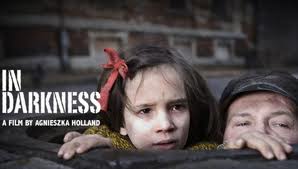In Darkness. New Film by Agnieszka Holland
 I had the chance to watch Agnieszka Holland’s new film before the Hungarian premier on the occasion of an exclusive screening organized by the Polish Institute in Budapest. The film confronts one of the hardest topics of Eastern-European history, namely that of the indifference of civil populations towards the fate of Jews during World War II. The protagonist is one of the above 6000 Poles who belong to the “Righteous among the Nations” (those Gentiles who saved Jewish lives during the Holocaust). At the same time most Gentile characters of the narrative either collaborate with the Nazi occupiers or remain simply indifferent towards the persecution committed by them.
I had the chance to watch Agnieszka Holland’s new film before the Hungarian premier on the occasion of an exclusive screening organized by the Polish Institute in Budapest. The film confronts one of the hardest topics of Eastern-European history, namely that of the indifference of civil populations towards the fate of Jews during World War II. The protagonist is one of the above 6000 Poles who belong to the “Righteous among the Nations” (those Gentiles who saved Jewish lives during the Holocaust). At the same time most Gentile characters of the narrative either collaborate with the Nazi occupiers or remain simply indifferent towards the persecution committed by them.
The story – based on true events as usual for Holocaust films – might have been a basis for a very exciting film since it tells the story not of a good kind-hearted man but that of a thief who starts to help Jews in escaping only for money, but getting more and more involved in their fate in the end saves them even when they cannot pay his favor anymore. However, in vain resembles the narrative of the escape in the channel-system of Lviv another important Polish film – Kanal by Andrzej Wajda – with plenty of Biblical and liturgical allusions both to Christianity and Judaism, Agnieszka Holland does not succeed in achieving the same impact as Wajda.
The wandering of a small group of persecuted Jews in a channel for 14 months provides an excellent basis for a drama. However one cannot remain involved in dramatic tension for more than 3 hours, so In Darkness demonstrates the typical case when “less is more”. Nonetheless to see this new confrontation with the history of Nazi occupation is probably a must for anyone interested in Polish-Jewish history.
The trailer of In Darkness available here: http://www.youtube.com/watch?v=nb2TyPfxaQU
Agnes Kelemen, Hungary
Nationalism Studies Department
This article was originally published in The CEU Weekly's 31th issue, March 27, 2013

Megjegyzések
Megjegyzés küldése